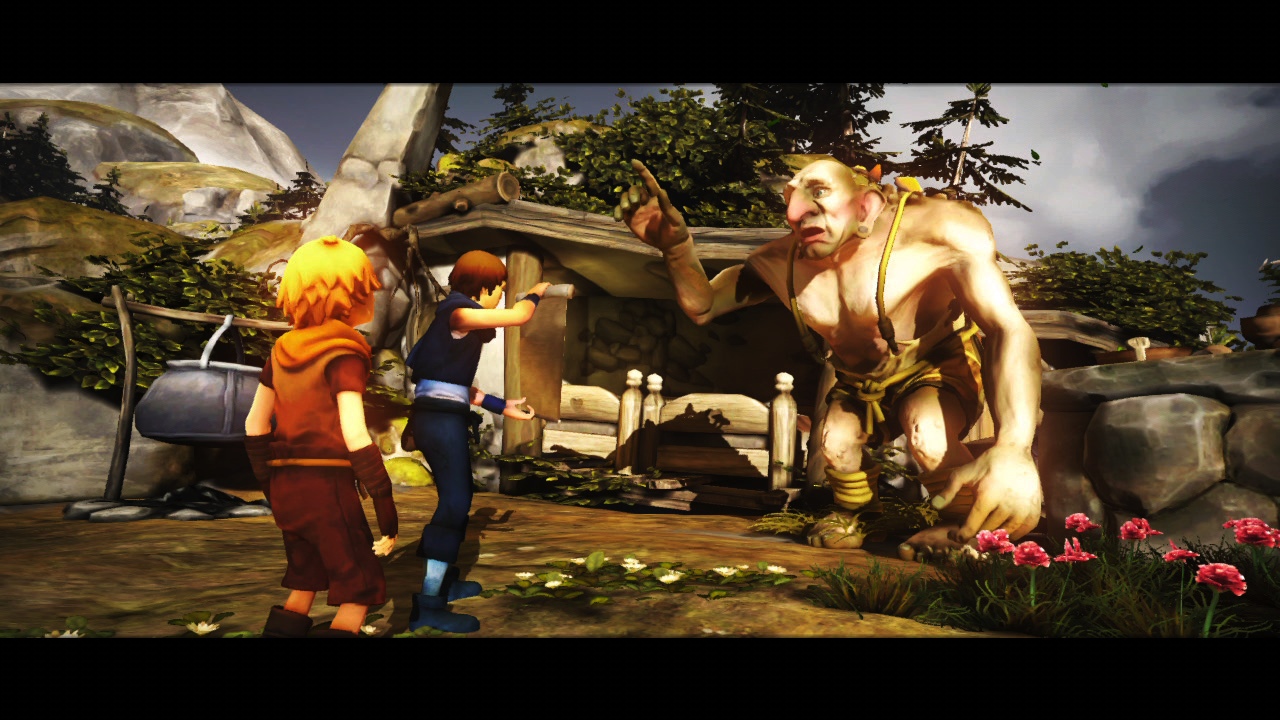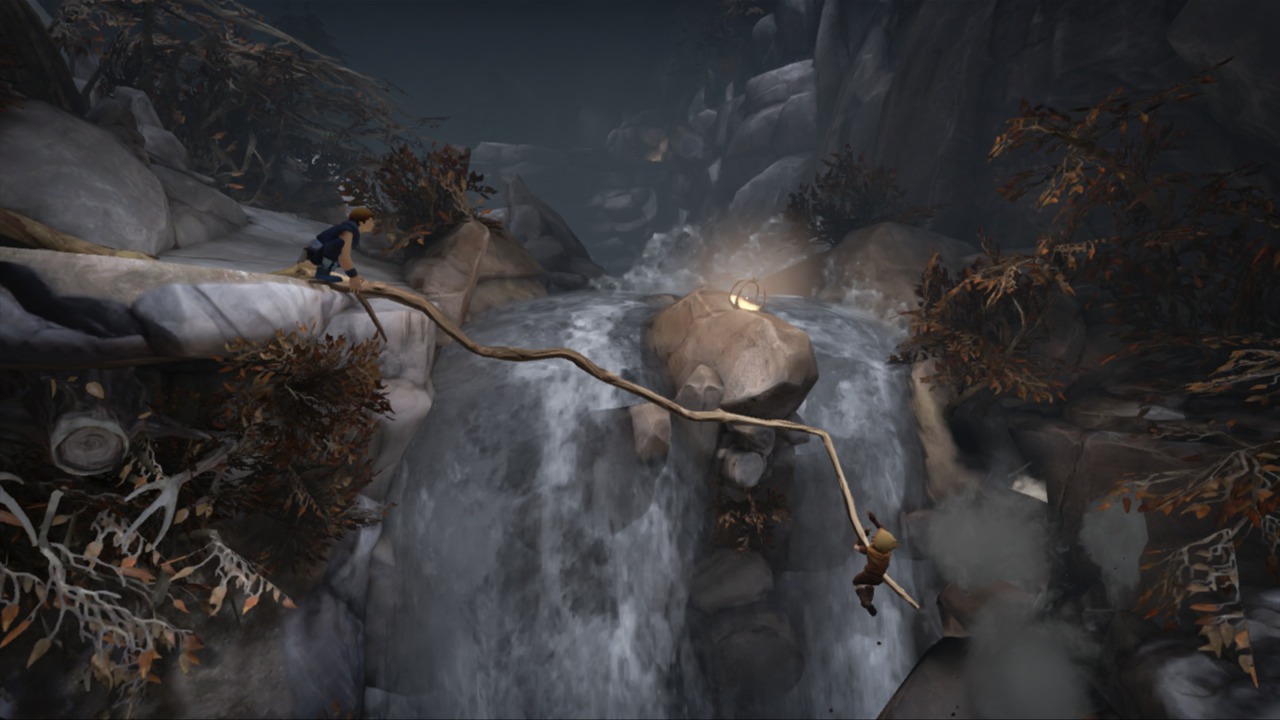Coming of Age with the Press of a Button
In which we see that by embracing the nature of the interactive medium, video game developers can create even more resonant experiences.
Brothers: A Tale of Two Sons blew me away. The heartfelt story of two brothers going on a grand journey moved me, the gorgeous environments and evocative art delighted me, and the clever control scheme and light puzzles intrigued me. These are the familiar elements that many games use to captivate players, but few games use them in harmony as well as Brothers. By designing narrative and gameplay to complement and enhance each other, Brothers conveys emotion in a uniquely poignant way and proves itself a powerful example of the expressive potential of video games.
(Be warned, the following contains major spoilers for Brothers: A Tale of Two Sons. If you are merely curious about the game, I suggest you read Mark Walton's eloquent and spoiler-free review. The game only takes about 4 hours to complete and I highly recommend experiencing it for yourself before you read on. It's wonderful.)
Assassin's Creed Shadows Hands-On Preview DOOM: The Dark Ages | Gameplay Sizzle Trailer NINJA GAIDEN 2 Black Official Launch Trailer NINJA GAIDEN 4 Official Announce Trailer Assassin's Creed Animus Hub - Explanatory Overview Trailer Assassin's Creed Shadows: Story Trailer Merchant 64 ~ Announcement Trailer ~ Genshin Impact - Version 5.4 "Moonlight Amidst Dreams" Trailer Black Ops 6 - Season 02 Cinematic Trailer Pokémon TCG Pocket: Space-Time Smackdown | Coming Soon! PAYDAY 3: Don't Be a Hero Trailer Vampires: Bloodlord Rising | Dragos Gameplay Trailer
Please enter your date of birth to view this video
By clicking 'enter', you agree to GameSpot's
Terms of Use and Privacy Policy
Brothers begins laying the groundwork for its best moments in the tragic first scene. The younger brother watches helplessly as his mother drowns in front of him, and soon after, his father falls ill with a mysterious ailment. In order to save him, both brothers embark on a journey to find a mystical tree high in the mountains. When they come upon a river they must swim across, however, the younger brother balks. Still traumatized by his mother's death, he must cling to his older brother's back to make it across.
This dependency goes both ways. The older brother is too large to fit through small gaps that the younger can squeeze through, and big brother can boost his sibling up to ledges that neither would be able to reach alone. Such simple puzzles build on the theme of connectedness. The two brothers are already bound to each other narratively by blood and by the quest to help their father. The environmental design forces them to work together to overcome the obstacles they face, cleaving them to each other through gameplay. And because the left stick and trigger control the elder and the right stick and trigger control the younger, the two are even further bound together on a fundamental mechanical level.
Having to control two characters at once is a curious sensation. The two are physically separate and are controlled separately, yet they must act--you must make them act--in unison. As the brothers are bound to each other through different aspects of the game's design, so too are you connected to them. This is a particularly good example of one of the fundamental strengths of video games: the ability to make you feel connected to characters by putting you in control of them.
Brothers builds on this basic connection by drawing you into the emotional bond between the two boys. The gibberish they speak conveys mood and tone perfectly well, and through their exclamations and their actions you see their personalities emerge. You may be drawn to the elder's politeness or the younger's ebullience, or put off by the younger's impertinence or the elder's rigidity. With strengths of one complementing the flaws of the other, the brothers cover more emotional range than a single character could and make it easy to identify with them.

And so Brothers crafts a deep fellowship. By controlling them both, you develop an instinctual sense for each boy's place in the world. Each spoken phrase or idle gesture speaks volumes to you. You get the sense that no more could these two part ways than your hands could detach and walk away from each other. This easy, unthinking intimacy feels like brotherliness, and only through the harmonious interplay of narrative, level design, and gameplay is Brothers able to achieve such a credible representation of that deep bond.
With the foundation of brotherhood established, Brothers sets its sights on other, darker emotions. Because the brotherly bond is so skillfully woven, it becomes all the more upsetting when it begins to fray. A beguiling new presence captures the elder brother's attention late in the game to the confusion and dismay of the younger. There is a period of uneasiness that puts you on edge, and after a dramatic and tragic encounter, the older brother is gravely wounded. For the first time in the game, the younger sets off on his own, desperate to find the item he hopes will save his brother. As you guide him up a twisting, winding tree, the contorting environment mirrors the disorienting feeling of using only your right hand to play the game that has demanded both for so long. When you emerge from the tree, disorientation turns to shock. The older brother has died.
I was playing the same game, but I was no longer playing the same game.
How can you convey the feeling of loss? The death of a beloved character can make you feel sadness and regret, but grief goes deeper. There is an emptiness, a hollowing out, a physical sense of loss that mere narrative often fails to capture. But the sensation of my left hand gripping the controller passively, lying dormant while my right continued to work, that sensation felt to me like loss. The physical balance of my play experience was upset; I was playing the same game, but I was no longer playing the same game. Something had been lost.
When a beloved family member passed away recently, my life took on a similar fractured quality; I was leading the same life, but my life was no longer the same. A loss like that reverberates throughout many aspects of life, and so it seems only natural that to convey this poignant sense of loss, Brothers uses multiple aspects of the game. The narrative informs you of your loss by showing you the lifeless body and the weeping younger brother. But you aren't simply told, not merely shown. You are forced to change the way you interact with the game on a physical level and then, in your hobbled state, you must bury your brother. With each pile of dirt you push onto his corpse, you see him passing from your life and you feel your left arm lying limp by your side, a physical manifestation of virtual death.

The emotional impact of this moment is intense, and only the interactivity of the medium allows it to carry the weight that it does. But this isn't Brothers' last trick. Carried to within shouting distance of his home, the younger brother faces an insurmountable challenge. In order to reach his father and deliver the cure, he must swim across a dark expanse of water. It's not possible. At every watery obstacle prior, you moved the elder brother to the shore, pulled the left trigger to make him dive in, then moved the younger towards him and pulled the right trigger to make him grab on to his brother. Yet even as you remember this simple solution, it dawns on you what you must do.
You pull the left trigger. This is a profoundly odd feeling because your mind has so securely bonded the younger brother to your right hand. It feels wrong. It feels uncomfortable. But sure enough, the left trigger sends him foundering and flailing into the water where he slowly makes his way across to the far shore. In that brave act, the younger brother confronts his fears and forges onward, growing up a bit in the process. This narrative coming of age is underscored by your physical action; by pulling the left trigger, you make the younger assume the role of the elder. Because this act is a subversion of what you've been doing for the whole game, you feel some of the trepidation and unease that accompanies the transition from childhood to adolescence. And amidst this tumult of emotions, there is a note of comfort, an assurance that even when our loved ones pass away, a part of them stays with us.
Brotherhood, grief, maturation. These aren't the themes you might expect to find conveyed honestly and authentically in a video game, and yet Brothers: A Tale of Two Sons does just that. By treating the physical act of using the controller as part of the emotional experience of playing a game, developer Starbreeze Studios leverages the interactivity of the medium to create something special. The potential of video games to probe the human condition is vast indeed, and it's inspiring to play a game that takes on that noble challenge.
Got a news tip or want to contact us directly? Email news@gamespot.com
Join the conversation